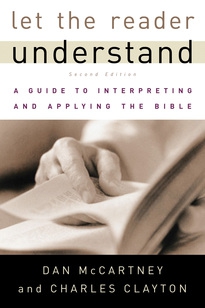This fall I had the privilege of taking an independent-study course on the Psalms with Geneva College’s Old Testament professor Dr. Byron Curtis. My first reading assignment was Dan McCartney and Charles Clayton’s Let the Reader Understand (P&R, 2002). This helpful book defined the categories for some of the interpretive problems that arise when considering the Psalms or any other book of Scripture. The review below is a course paper I wrote to summarize the book and connect it to the study of the Psalms.
 One of the most persistent problems in biblical hermeneutics, at least from a layman’s perspective, is positing that a problem exists. Many Christians are content to consider the question of scriptural interpretation only in regard to particularly difficult books such as Daniel or Revelation, while leaving the more “obvious” passages of the Bible to the interpretation that comes most naturally, whether obtained from private study, homiletic application, or current Christian literature. Dan McCartney and Charles Clayton begin their book Let the Reader Understand: A Guide to Interpreting and Applying the Bible (Phillipsburg, NJ: Presbyterian & Reformed Pub. Co., 2002) by establishing the central problem of hermeneutics: “Does the Bible teach something in particular, or is the meaning of a text simply ‘what I get out of it’?” (p. 1). How can we be sure our interpretation is accurate? How can we affirm with certainty what God’s revealed will for us is? “If we regard the Bible as the fountainhead of our faith, it is crucial that we resolve this problem. If we are to obey God, we must first understand what he said. If we are to believe, there must be something there for us to believe” (p. 2).
One of the most persistent problems in biblical hermeneutics, at least from a layman’s perspective, is positing that a problem exists. Many Christians are content to consider the question of scriptural interpretation only in regard to particularly difficult books such as Daniel or Revelation, while leaving the more “obvious” passages of the Bible to the interpretation that comes most naturally, whether obtained from private study, homiletic application, or current Christian literature. Dan McCartney and Charles Clayton begin their book Let the Reader Understand: A Guide to Interpreting and Applying the Bible (Phillipsburg, NJ: Presbyterian & Reformed Pub. Co., 2002) by establishing the central problem of hermeneutics: “Does the Bible teach something in particular, or is the meaning of a text simply ‘what I get out of it’?” (p. 1). How can we be sure our interpretation is accurate? How can we affirm with certainty what God’s revealed will for us is? “If we regard the Bible as the fountainhead of our faith, it is crucial that we resolve this problem. If we are to obey God, we must first understand what he said. If we are to believe, there must be something there for us to believe” (p. 2).
McCartney and Clayton begin with a study of presuppositions, which immediately challenges schools of “higher criticism” of the Bible. The most basic of the Bible’s presuppositions is “that submission to the God who speaks in his Word is the first step in understanding him” (p. 9). This is true not just because of sin, which darkens our perception of the ways of God, but simply because of our finite capacity of understanding. The fact that this Word is expressed in ordinary human language denies us access (for now) to a comprehensive, absolute knowledge of God. Yet the Scriptures do indeed contain all that is necessary for life and godliness, and the authors make the case that the ambiguity of human language is the Bible’s asset rather than its deficiency: “[I]f language were totally unambiguous, precise, and exhaustive, then words about God would be sufficiently inadequate to make them idolatrous. The flexibility of the elements of language is what enables sentences to be perfectly, though not exhaustively, true” (p. 20). The Bible’s nature as both the inspired Word of God and a book in ordinary human language should drive us to place ourselves under its authority while also exercising every effort to understand its true meaning.
Central to McCartney and Clayton’s presentation of hermeneutics is the role of the Holy Spirit, who “convicts and assures us of the truthfulness and trustworthiness [of the Bible] as we find it in Scripture” (p. 74). Not only did the Holy Spirit inspire the original authors of the text, he also continues to illumine the hearts of believers as they seek to understand the will of God. While there is “an accomplished, objective, definitive, and unrepeatable dimension,” through the Spirit “the Word is also applied continuously to individuals, who subjectively experience it coming alive to them, meeting their needs in special situations” (p. 75). Reinforcing the authors’ earlier presupposition about ultimate submission to the Word of God, interpreters of the Bible must recognize that it is only the Holy Spirit who can confront us with the divine authority of its texts.
From this starting point, the authors proceed to explain the history of biblical interpretation through the church, beginning with the early interpretations of Justin Martyr and Irenaeus and continuing through the influence of Derrida’s poststructuralism in contemporary scholarship. McCartney and Clayton then introduce the grammatical-historical method, which places the words and phrases of Scripture into a linguistic and cultural framework in order to reveal the authors’ original meaning. Building on this foundation, the authors introduce four principles to derive a present meaning from grammatical-historical analysis: the meaning must be organically related to the human author’s meaning; the meaning must be consistent with the total revelation in the Bible; the meaning must point to God’s redemption; and the interpretation must remain subject to the Holy Spirit’s directing of the church (pp. 173, 174). Putting these principles into practice, McCartney and Clayton outline a plan for studying God’s Word: preparing spiritually, consulting multiple Bible translations, considering discourses rather than just words and sentences, and discovering the historical and cultural background of the text. In closing, Let the Reader Understand discusses the various literary genres within the Bible and suggests how proper exegesis should shape Christian worship and witness.
What distinguishes Let the Reader Understand from many contemporary works on biblical exegesis, both popular and scholarly, is the humility with which it approaches the Word of God. The author’s statement that “genuine understanding occurs to the degree that our basic presuppositions and operating assumptions are in line with those of the Bible” (p. 289) roots hermeneutics in a realization of the authority of the Word of God, not an arrogant demand for the Bible to prove its worth. Related to this perspective is an acknowledgment of both the perspicuity (clarity or simplicity) of Scripture and its unfathomable depths. A solid exegesis of many Bible passages can begin with a very simple, literal interpretation, which accumulates significance in the “hermeneutical spiral” of contextual and historical analysis (p. 40). In this way, Let the Reader Understand encourages careful study of the Scriptures while undermining critical scholarship’s claims to self-sufficiency.
Let the Reader Understand is a uniquely valuable introduction to hermeneutics, deftly explaining difficult philosophical concepts and navigating complex interpretive arguments while remaining readable. One of the book’s notable features its extensive crossover to questions of philosophy and communication, some of which seem unrelated at first to Biblical interpretation. For example, Chapter 4 delves into the ideas of F. de Saussure, C. Levi-Strauss, and J. Derrida, while Appendix A provides a ten-page discussion of the question “Where is meaning?” However, such conversations are key to appreciating the rest of the book—not only because of their relevance to communication studies, but because they interact with the philosophies that have consciously or unconsciously shaped much of the debate over biblical interpretation in recent years.
This review would be incomplete without mentioning the special value of Let the Reader Understand for a study of the Book of Psalms. Although it may not be debated as hotly as prophetic or apocalyptic literature, the genre of biblical poetry can present significant problems of interpretation for the thoughtful Christian. While popular views of the Psalms may treat them as collections of inspirational sayings for a faith-based life, the organization of this collection (Why five books? How are the Psalms laid out?) and their historical nature as the songbook of ancient Israel challenge us to reconsider this common perception. The Psalms have often fallen victim to hermeneutical crimes like quoting Psalm 46:10, “Be still, and know that I am God,” without recognizing the object of this command (the warring nations on earth) or the context of the surrounding Psalm. In addition, the difficult themes of lament and imprecation throughout the Book of Psalms present a challenge to any modern reader. How are Christians to understand vindictive statements such as “May they be…like a stillborn child that never sees the sun” (Psalm 58:8 NIV) or “May his children be fatherless and his wife a widow” (Psalm 109:8)?
Let the Reader Understand offers a way toward greater understanding of the Psalms by affirming their divine inspiration, not just their historical or cultural value. The authors describe several modern theories of interpretation such as the autonomous text theory, the reader-response theory, and the sociolinguistic-community theory (p. 24). Yet all of these drain the psalms of the spiritual value that makes them much more than interesting artifacts of ancient Israel. Studying how the Psalms are referenced by New Testament authors, recognizing the redemptive-historical context of these songs of the saints, and understanding the genre of poetry are a few of the applications that can be made from this book to a study of the Psalms, each of which will yield rich rewards in individual or corporate hermeneutical efforts.
Of course, to return to the central message of Let the Reader Understand, the most important factor in understanding the Book of Psalms is the recognition that these songs, like the rest of Scripture, point to the salvation accomplished by Jesus Christ. McCartney and Clayton quote the church father Irenaeus in regard to the New Testament fulfillment of Old Testament prophecy: “And therefore when the Law is read by Jews at the present time, it is like a myth; for they do not have the explanation of everything, which is the coming of the Son of God as man. But when it is read by Christians, it is a treasure, hidden in the field but revealed by the cross of Christ” (qtd. p. 85). Without the aid of the Holy Spirit, the Book of Psalms will be just another record of the worship practices of an ancient nation. But with the Holy Spirit’s help, this collection of songs will inspire us with newfound praise when we discover in them “the sufferings of the Messiah and the glories that would follow” (I Peter 1:11).
–MRK

Leave a reply to Michael Kearney Cancel reply